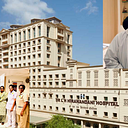Monsoon and Kidney Health: A Delicate Balance — Hiranandani hospital Kidney
As the monsoon rains cascade across the Indian subcontinent, they bring a welcome reprieve from the sweltering summer heat. However, a hidden health threat — an increase in renal diseases — often lies within the calming pitter-patter of rainfall. It is crucial to comprehend the complex link between monsoon conditions and kidney diseases, and adopting preventative measures becomes essential to maintaining renal health.
We turn to the wise wisdom of Dr Sujit Chatterjee Hiranandani Hospital Powai, in an effort to decipher the complex relationship between the monsoon and renal health.He illuminates the interesting relationship between monsoons and kidney health. He is renowned for his expertise in healthcare, particularly kidney transplant treatments. Additionally, he provides a thorough list of recommendations for preventatively defending one’s kidneys against dangers this time of year.
Monsoon and Kidney Diseases: Decrypting the Link
Dehydration Redefined: Contrary to common belief, dehydration remains a concern during the monsoon. The temperate weather often deceives individuals into reducing their water intake, as the sensation of thirst diminishes. However, the humidity and perspiration persist even amidst the rains, contributing to fluid loss. This dehydration can impose undue strain on the kidneys, potentially leading to various renal issues.
The Shadow of Contaminated Water: The monsoon, for all its blessings, has a tendency to bring water contamination to the forefront. Heavy rains wash pollutants and contaminants into water sources, including the water we consume. Consuming such contaminated water can swiftly translate into kidney infections and other gastrointestinal maladies, which, in turn, can exacerbate kidney problems.
The Proliferation of Infections: The monsoon season’s increased humidity provides the perfect environment for the growth of germs and viruses. As a result, urinary tract infections (UTIs), a prevalent condition that can harm kidney function if left untreated, are on the rise.
Preventing Kidney Damage During the Rainy Season: Proactive Measures and Strategies
Dr. Sujit Chatterjee Hiranandani Hospital Kidney, emphasises the critical need of taking preventative steps in order to protect kidney health during the monsoon, especially for people with pre-existing illnesses and those who have had kidney transplant surgeries. The following advice and tactics are essential:
Hydration — The Rainy Season Elixir: Irrespective of the perceived decrease in thirst, maintaining optimal hydration levels remains non-negotiable. Aim for a minimum of 8–10 glasses of clean, purified water daily. It is essential to steer clear of street-side vendors and prioritize the consumption of safe, potable water.
Personal Hygiene: Shielding Against Infections: Practicing impeccable personal hygiene, particularly after exposure to rain, is an efficacious preventive measure. Swiftly changing out of wet clothes and employing antiseptic soap for bathing goes a long way in averting infections.
Nourishment and a Balanced Diet:It is crucial to nourish your body with a balanced diet that is rich in fruits and vegetables. These nutritious meals include important vitamins and antioxidants that support the immune system, creating a strong barrier against kidney damage.
Adherence to Medications: If you grapple with underlying health conditions, such as diabetes or hypertension, strict adherence to prescribed medications is non-negotiable. Regular check-ups with your healthcare provider serve as crucial checkpoints during this season.
Prudent Healthcare Choices: The impulse to self-medicate for minor ailments should be resisted. Consulting a healthcare professional for a comprehensive diagnosis and appropriate treatment is the safest path to tread.
Water Safety: Boil or Purify: It is imperative to ensure that all water destined for consumption or culinary purposes is subjected to proper boiling or purification methods. Such diligence dramatically mitigates the risk of waterborne diseases.
Environmental Vigilance: Efforts should be directed towards preventing water stagnation around your living environment. Stagnant water serves as fertile breeding grounds for disease-carrying mosquitoes and other pathogenic agents.
In conclusion, although the arrival of the monsoon season is eagerly awaited, it can also bring new health risks, particularly those related to renal illnesses. The CEO of Hiranandani Hospital Kidney, Dr. Sujit Chatterjee, emphasises the value of education and preventative actions. People may enjoy the monsoon’s beauty without jeopardising their priceless renal health by ensuring sufficient hydration, keeping strict personal hygiene, and getting medical help as soon as required. This preventive strategy not only protects kidney health, but it also makes the monsoon season healthier and more pleasurable overall.
